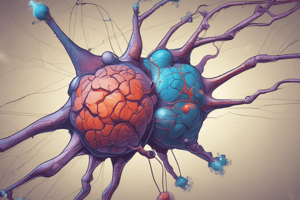Podcast
Questions and Answers
What is the primary mechanism through which adrenaline increases muscle contraction?
What is the primary mechanism through which adrenaline increases muscle contraction?
- Inhibition of phosphodiesterase
- Increased cAMP levels (correct)
- Inhibition of calcium efflux
- Activation of guanylate cyclase
Which adrenergic receptor is primarily responsible for increasing heart rate?
Which adrenergic receptor is primarily responsible for increasing heart rate?
- β2
- α1
- α2
- β1 (correct)
Which of the following is NOT a therapeutic use of adrenaline?
Which of the following is NOT a therapeutic use of adrenaline?
- Asthma
- Anaphylaxis
- Depression (correct)
- Cardiac arrest
What is one of the main adverse effects of adrenaline?
What is one of the main adverse effects of adrenaline?
Which condition serves as a contraindication for the use of adrenaline?
Which condition serves as a contraindication for the use of adrenaline?
Which effect of adrenaline is primarily mediated through β2 adrenergic receptors?
Which effect of adrenaline is primarily mediated through β2 adrenergic receptors?
What physiological effect does adrenaline have on blood pressure?
What physiological effect does adrenaline have on blood pressure?
In which way does adrenaline affect metabolism?
In which way does adrenaline affect metabolism?
What effect does adrenaline have on the respiratory system?
What effect does adrenaline have on the respiratory system?
What is the dosage range for intravenous administration of adrenaline?
What is the dosage range for intravenous administration of adrenaline?
Study Notes
Chemistry and Pharmacology
- Adrenaline (epinephrine) is classified as a catecholamine and is synthesized from tyrosine.
- It shares structural similarities with noradrenaline (norepinephrine) and dopamine.
Mechanism of Action
- Binds to adrenergic receptors: α1, α2, β1, and β2 types.
- Activates adenylate cyclase, leading to elevated levels of cyclic AMP (cAMP).
- Promotes calcium (Ca++) influx, which boosts muscle contraction effectively.
Pharmacological Effects
Cardiovascular
- Elevates heart rate and enhances myocardial contractility through β1 receptors.
- Results in increased blood pressure.
- Causes vasodilation in skeletal muscle via β2 receptor activation.
Respiratory
- Facilitates bronchodilation through β2 receptor stimulation.
- Enhances respiratory rate for improved airflow.
Metabolic
- Induces hyperglycemia by promoting glucose release into the bloodstream.
- Stimulates lipolysis, thereby increasing fatty acid availability.
Smooth Muscle
- Relaxes uterine smooth muscle, which is critical during certain medical conditions.
- Stimulates contraction of sphincter muscles for various physiological processes.
Central Nervous System
- Heightens alertness levels and can lead to increased anxiety among users.
Therapeutic Uses
- First-line treatment for anaphylaxis to counteract severe allergic reactions.
- Administered during cardiac arrest to restore heart function.
- Utilized in managing asthma by relieving bronchoconstriction.
- Effective for treating various allergic reactions.
- Used in glaucoma management to lower intraocular pressure.
Adverse Effects
- Can cause hypertension, necessitating careful monitoring.
- May lead to tachycardia and potential arrhythmias.
- Common side effects include anxiety, tremors, and insomnia.
Contraindications
- Not recommended for individuals with hypertension due to exacerbation risks.
- People with coronary artery disease should avoid its use.
- Individuals with existing cardiac arrhythmias face heightened risks.
- Patients with hyperthyroidism and pregnant women (except in emergencies) should not use adrenaline.
Dosage
- IV administration: 0.1-0.5 mL of 1:1000 solution.
- IM injection: 0.5-1 mL of 1:1000 solution.
- For inhalation: 1-2 puffs using a metered-dose inhaler for respiratory conditions.
Studying That Suits You
Use AI to generate personalized quizzes and flashcards to suit your learning preferences.
Description
This quiz covers the key concepts of adrenaline pharmacology as outlined in KD Tripathi's textbook. It includes information about adrenaline's chemistry, mechanism of action, and its cardiovascular effects. Test your understanding of how this catecholamine functions in the body.




